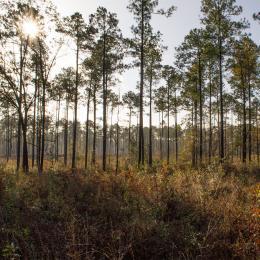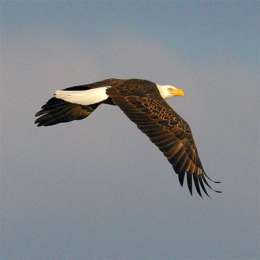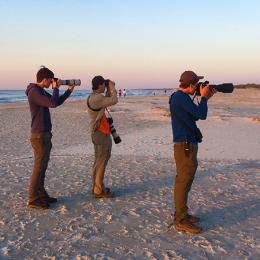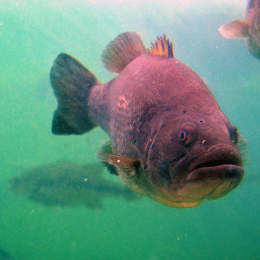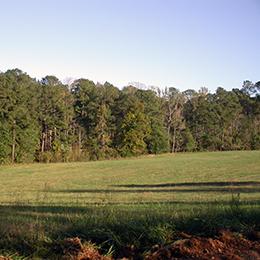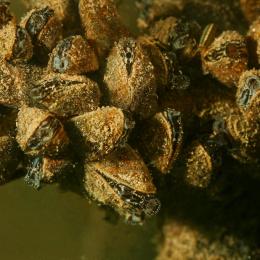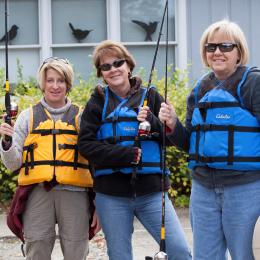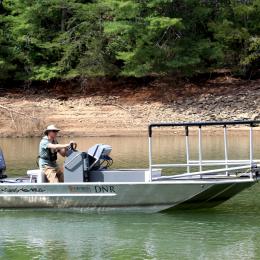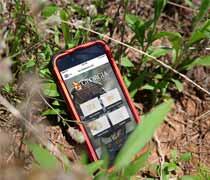What is Environmental Review?
Environmental review staff at the Wildlife Conservation Section can assist with information requests and the review of Georgia rare species and natural community data for specific projects or actions within the state. These reviews are generally site-specific. During the environmental review process, we provide information regarding high-priority species and habitats within an area of interest, official communications stating a review of the proposed project or action has been completed by our office, and related recommendations from the state. This information is compiled in an environmental review letter and delivered to the individual requesting project review.
Who needs to request an environmental review?
If a proposed action may impact rare natural communities or species within Georgia, we advise consultation with our office. You may reach out to our shared email inbox Nongame.Review@dnr.ga.gov, or to one of the specific environmental review biologists listed below, for guidance on whether your project requires an environmental review.
Not all projects require a full review from our office. We may consult on a proposed project or action, but only provide an environmental review letter when specific comments need to be documented for project record. For grant proposals, T&E screenings, small projects in urban areas, projects involving small modifications to an existing developed site, or actions that would not disturb any natural habitats or aquatic resources, we may provide no official comment. In these cases, you may access necessary information for high priority species and natural communities near the area of interest by using our Georgia Biodiversity Portal. You may use the appropriate County, Quarter Quad, HUC 10 Watershed, or other lists by location for project documentation of rare species or natural communities that may occur near the proposed action. These datasets are also downloadable. However, if there is a potential habitat for Georgia species of concern at the site, you should request further information from our office.
Large-scale projects, projects in previously undeveloped areas, and projects that involve activities which impact rare species, natural habitats, or aquatic resources should receive formal comment from our office. All proposed projects subject to the Georgia Environmental Protection Act (GEPA) or the National Environmental Policy Act (NEPA) should be reviewed by our office. We have several guidelines in place for review of federally or state-funded grants, programs, and actions.
If you believe you need to initiate an environmental review, please see the following links below:
- Guidelines for Grant Programs and the State Environmental Review Process (SERP)
- Requesting Information for Sites
- Requesting Information for Large Sites (Greater than 1,000 acres)
- Environmental Review Work Areas and Contact Information
- Solar Facility Development in Georgia
Guidelines for Grant Programs and the State Environmental Review Process (SERP)
Below are some common grant programs and state processes that require review by or intergovernmental consultation with our office:
DNR Grant Proposals (Georgia Outdoor Stewardship Program, Land and Water Conservation Fund, Recreational Trails Program)
If you are applying for a grant from the Georgia Department of Natural Resources, please contact the applicable program coordinator for the most up-to-date requirements regarding environmental review by our office. If you are instructed to submit your grant proposal for review, please submit the proposed project package to Nongame.Review@dnr.ga.gov using the instructions below.
USDA Rural Development Fund Grants
If you are applying for funding associated with the USDA Rural Development Fund and need an environmental review from our office, please submit your grant package to Nongame.Review@dnr.ga.gov using the instructions below. Our office may not provide comment on the proposed project, depending on what activities are proposed and the location of the proposed project, but will keep record of your submission to our office.
State Environmental Review Process (SERP)
The State Environmental Review Process (SERP) is coordinates by Georgia DNR’s Environmental Protection Division to provide intergovernmental consultation for proposed actions in compliance with the Georgia Environmental Protection Act (GEPA). SERP includes the review of environmental information documents from proposed projects funded by the Georgia Environmental Finance Authority (GEFA) state revolving funds, such as the Clean Water revolving fund (CSWRF) and the Drinking Water revolving fund (DWSRF), or funds from the American Rescue Plan Act (ARPA). If you are applying for funding associated with this process, you may submit the proposed project’s environmental planning document package to Nongame.Review@dnr.ga.gov using the instructions below to receive an environmental review from our office. Please state in your submission whether you intend to request a categorical exclusion (CE) or a notice of no significant impact (NONSI).
Requesting Information for Sites
Unless otherwise specified, requests for information regarding project-specific sites will be filled via an official environmental review letter from our office signed by a wildlife biologist. For instructions on how to initiate these information requests, please see below.
If you would like to request data for research or other analyses purposes, please email both Nongame.Review@dnr.ga.gov and GABiodata@dnr.ga.gov for further guidance. Please note that our data is publicly accessible on our Georgia Biodiversity Portal, and can be downloaded at your convenience.
Threatened & Endangered Species Screenings
If you have been instructed to screen different sites for threatened or endangered species, please use our Georgia Biodiversity Portal. You may use the appropriate County, Quarter Quad, HUC 10 Watershed, or other lists by location to gather information regarding the likelihood of rare species or natural community occurrences at or near the proposed sites. Threatened and endangered species screenings should only be performed if a site location has yet to be selected for the proposed project and there are several alternatives being considered. If your project has a selected site and proposed activities, you should request an environmental review so we may review and comment on any on-site occurrences.
Submitting a Request to the Shared Environmental Review Inbox
Please send your request electronically to our shared environmental review inbox at Nongame.Review@dnr.ga.gov if:
- You and/or your agency/firm have never submitted a review request to our office, OR
- You are submitting a grant proposal review, SERP request, or other type of request that involves supplemental materials or documents, OR
- You are submitting a request for a site larger than 1,000 acres, or for multiple sites that total more than 1,000 acres.
Requests submitted via Nongame.Review@dnr.ga.gov should include, at a minimum:
- A description of the project, proposed activities, and possible environmental impacts.
- Locational information such as a shapefile (preferred), KMZ, center point latitude/longitude, street address, or a detailed map displaying this data.
Please Note: Our email server may block emails with compressed/zipped attachments without notification to either party (even with the .zip extension renamed). If you need to send zipped files, please follow-up to confirm that files were received, or use a file-sharing service such as OneDrive, WeTransfer, DropBox, or Google Drive.
Faxes and hard copies are no longer accepted for environmental review/information requests except in pre-approved cases. Please submit requests electronically.
Submitting a Request through GNAHRGIS
All site-specific review requests that involve no supplemental documentation and are less than 1,000 acres should be submitted through the Georgia's Natural, Archaeological, and Historic Resources GIS (GNARHGIS) Ecology Review and Survey Module.
If you and/or your agency/firm have never submitted a review request to our office, please send your initial project review request electronically as outlined above. After this initial request, you may request a GNAHRGIS Ecology Module account to make future requests if needed. Please send your account request to Nongame.Review@dnr.ga.gov.
New users of GNAHRGIS should review the How-To Video. Once you have watched the video and are familiar with the module functions, the following steps are required to initiate an environmental review from our office:
- Under the “Project” tab, click “Add Project” to define the area of your project and provide basic project information. Click Save.
- Note: GNAHRGIS will prompt you to upload a shapefile for your project. The shapefile must be in polygon format and be in a compressed (.zip) folder. Polyline/point shapefiles and non-compressed folders cannot be analyzed by the system.
- Once your project is created, you may either click “Add Review” from the project page or go to the “Reviews” tab, click “Add Review”, and select “Choose an existing project”. Choose the desired project and click “Make a Review”.
- A list of rare species and natural communities, conservation lands, and high priority watersheds at or near your project area should be displayed. Click “Save” once the list has generated.
- You may now click “Generate Review Document” and use this DRAFT list for project planning and scoping purposes. Please do not use the draft list for formal consultation or documentation purposes.
- Multiple draft reviews can be created for a single project. For example, draft reviews may be created multiple times to check whether new species occurrences near the project have been entered in our database over the life of the project.
- IMPORTANT: Creating a project or draft review does not initiate early coordination or environmental review from our office. To initiate project review by our office, you must continue to Step 3.
- To submit a project review request and receive a response from our office, you must click the “Submit to DNR” button. This button is on the project’s review page, which is accessible by clicking the “Review ID” number link under the “Reviews” tab. You may also submit draft reviews by clicking the “Submit” button in the “Project Status” column under the “Reviews” tab.
- A final review letter will be completed by our office and uploaded to GNAHRGIS once complete. You will receive an auto-generated email notifying you that the review is complete.
- If you have not received a response within 6-8 weeks, you may contact us to follow up on review status by either contacting the appropriate review biologist (see below) or Nongame.Review@dnr.ga.gov.
- Please note our office only requires re-review of a proposed project if changes occur to the proposed activities or the rare species and natural communities list for the project. If you’ve received an environmental review letter from our office in the past, you may contact the appropriate review biologist (see below) or Nongame.Review@dnr.ga.gov to confirm whether your project requires re-review.
For technical problems within the system, please contact us for assistance. Detailed descriptions of your difficulties, as well as screenshots, are recommended for timely diagnosis.
Environmental Review Work Areas
Our environmental review staff divides workload by geographic region. You may always contact Nongame.Review@dnr.ga.gov for assistance. For specific questions about your project or environmental review, you may also contact the appropriate review biologist based on the “Wildlife Conservation Section Environmental Review Work Areas” map below.
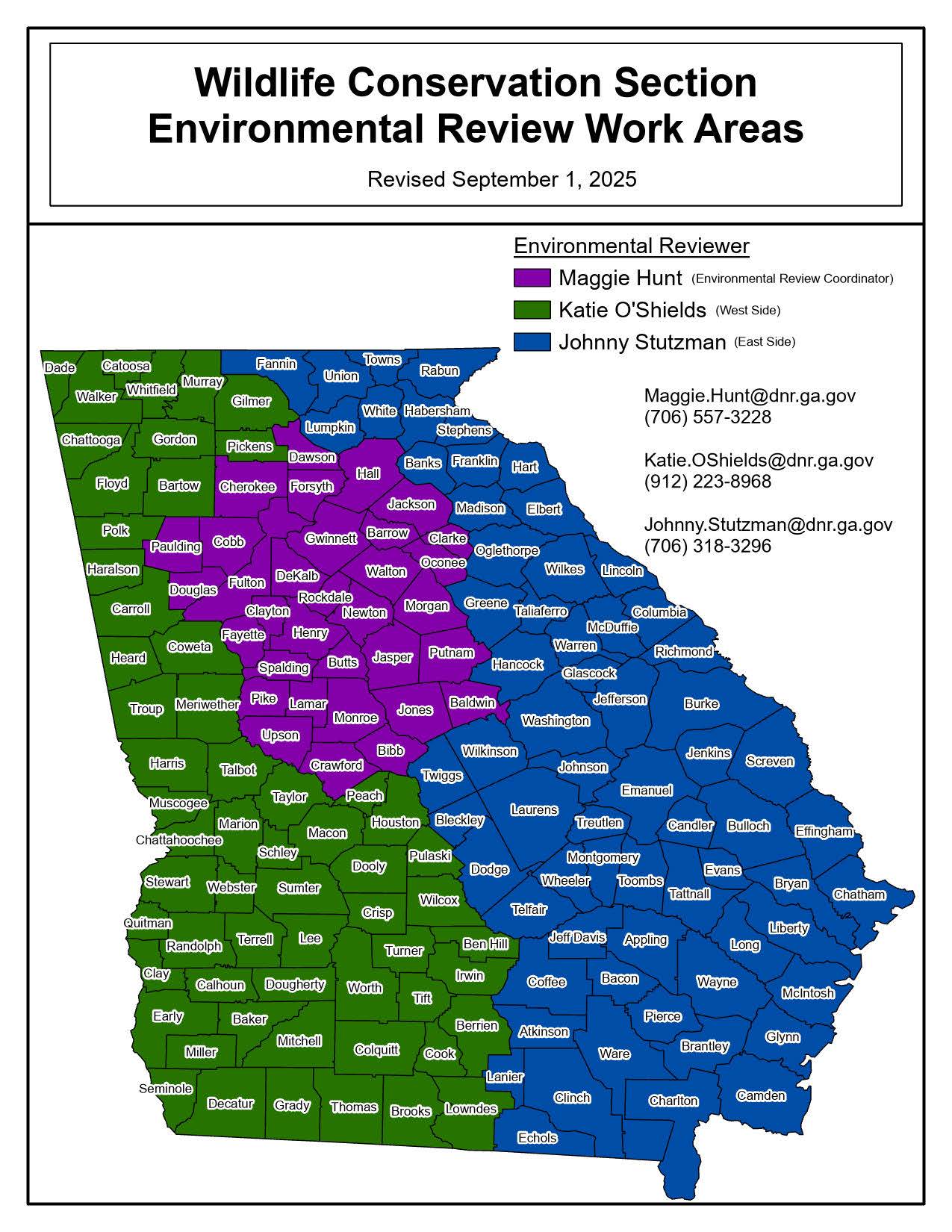
Solar Facility Development in Georgia
Solar facility development and planning have increased in recent years as solar energy becomes a more popular renewable energy investment. Solar farms produce little to no carbon emissions and are a promising form of sustainably sourced electricity. In particular, south Georgia has seen an influx of solar investment opportunities, as the climate and terrain in the region is preferential for solar array placement and productivity. However, these areas often overlap with biodiversity hotspots and rare or uncommon natural communities in our state. Commercial solar energy facilities often require landscape conversion to a form that cannot support the habitat needs of many species. Large solar farms lead to fragmentation of natural landscapes, which in turn negatively affects Georgia species of conservation concern.
Recommendations for solar development are provided during the environmental review process. You can view our recommended practices for siting and development at the links below. Prior to submitting your project for environmental review, we encourage conscientious siting of your planned solar facility. Reclamation of old agricultural fields for solar development is preferable to siting solar facilities in previously undeveloped spaces. The Nature Conservancy (Georgia Chapter) has partnered with Georgia DNR and NASA DEVELOP participants at the University of Georgia to create a low-impact solar siting tool that can be accessed at the link below. Please utilize this tool to avoid siting facilities in environmentally sensitive areas, such as protected lands and high-quality habitats for gopher tortoises and other protected wildlife.
TNC Georgia Low-Impact Siting Tool
Georgia Recommended Practices- Executive Summary
Georgia Recommended Practices Webinar Recording






